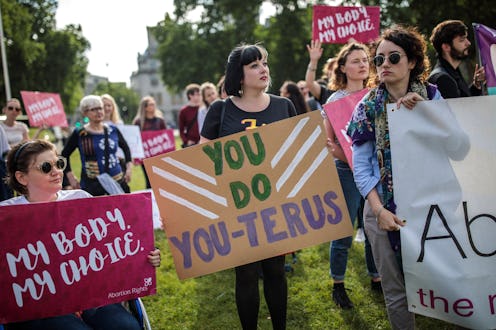News
People Are Already Preparing For The End Of Roe V. Wade — Here's What You Can Do To Help

Americans' access to abortion could largely depend on which political party holds the most power after this year's midterm elections. Previous court decisions from President Trump's new Supreme Court nominee, Brett Kavanaugh, indicate that he may rule against reproductive rights when those cases come before the high court. Kavanaugh's track record, coupled with Trump's vow to appoint justices who would overturn the constitutional protection for abortion, has led advocates to start preparing for what happens if Roe v. Wade falls.
"I came of age before Roe v. Wade, so I know what it was like when women didn’t have a choice. We can’t go back to those days,” Sen. Jeanne Shaheen (D-NH) says in a statement to Bustle. “There are midterm elections in only a few months, so it’s imperative that women, and all Americans, understand where their local politicians stand on women’s reproductive rights and send a clear message that women’s healthcare decisions should be made between a woman and her doctor.”
Abortion advocates are fighting Kavanaugh's confirmation at the same time that many are bracing for a scenario in which he's seated on a Supreme Court that then dismantles abortion rights. Individual states have been chipping away at abortion access for years, but the nomination of a new conservative Supreme Court justice gives the abortion rights movement and those grassroots systems that help women navigate restrictive abortion laws a renewed sense of urgency.
Just nine states have laws on the books that protect the right to an abortion, while 22 states risk losing access to abortion altogether if Roe v. Wade is overturned. According to Susan Inman, the chief counsel for federal policy and advocacy at the Center for Reproductive Rights, those 22 states are where people who support a woman's right to choose should focus their energies right now. Access to abortion is already grim in many of those states, but it has the potential to get much worse.
"For five years I’ve been answering calls on our call line here in Mississippi, and what I don’t want to hear ever again is, 'Ms. Laurie please help me or I’m going to drink this bleach,'" Laurie Bertram Roberts, executive director of the Mississippi Reproductive Freedom Fund, tells Bustle. "It’s something I’ve heard often, especially from a lot of our younger girls who live in rural areas."
Abortion funds like Roberts' are already in place across the country to help women pay for abortion procedures and travel out of state to obtain one if necessary. Their work will become even more vital if Roe v. Wade falls and states begin outlawing abortion outright.
"To me it’s no different than setting up needle exchanges, or providing sex workers with condoms. These are things that you want for public health, because no one should have to die."
Mississippi currently has just one abortion clinic, and is one of four states with a "trigger ban" on the books that is poised to ban abortion the moment Roe is overturned. To prepare for that day, the Mississippi Reproductive Freedom Fund is ramping up efforts to inform its community about how to safely use misoprostol, a pill commonly taken along with mifepristone for medication abortions.
"To me it’s no different than setting up needle exchanges, or providing sex workers with condoms," Roberts says. "These are things that you want for public health, because no one should have to die."
Anyone looking to get involved and protect access to abortion should note that local abortion funds like the Mississippi Reproductive Freedom Fund run off of donations, and monthly pledges help them keep a sustainable budget. Beyond donations, Roberts says her organization could also use help with administrative work that can be done remotely. Such funds in states with limited access to clinics, like Mississippi, also need partners in other states who are willing to offer assistance when a woman travels for an abortion procedure.
Abortion funds help women travel out of state and self-manage abortions at home, but they can't solve every problem that may arise in the wake of an abortion ban — especially if states move to criminally punish women who end a pregnancy.
"This is why we need to ensure that Roe is preserved, because this is not a problem that can be fixed in small measure," Inman says. "If it’s illegal in a state, it will be illegal in that state, and women will face the consequences."
Some states are already taking steps to keep abortion accessible within their borders. In the last legislative session, 10 states introduced bills that would guarantee women the right to an abortion, although none of those have passed yet.
States like Oregon already have laws on the books that protect access to abortion, providing a roadmap for how to include such protections within broader health care bills. Oregon's Reproductive Health Equity Act of 2017 required insurers to cover abortions at no cost, as well as subsidize birth control and ensure that undocumented immigrants have access to reproductive health services.
Passing similar bills in other states and overriding "trigger bans" may require people pressuring their local lawmakers to do so, though. If protecting women's access to abortion is important to you, pay attention to who's running for statewide office in addition to the congressional elections. You may also consider volunteering for campaigns that promise to protect access to abortion at the state level.
Efforts to both restrict and expand access to abortion at the state level shouldn't be overlooked when it comes to preparing for the potential rollback of federal abortion protections. In a post-Roe America, states would hold all the power to determine when and where women can end a pregnancy.